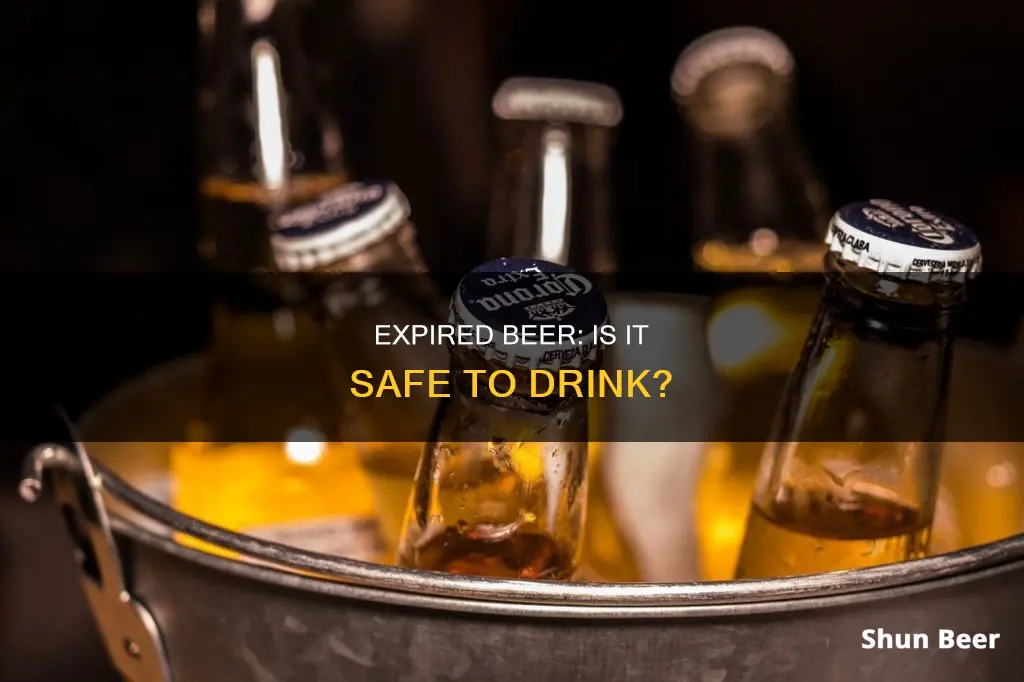
Drinking expired beer is generally safe, but it may not taste very pleasant. Beer has a best before date, not an expiration date, which means it is safe to consume past this date, but the taste and quality will deteriorate over time. Beer is unlikely to make you sick due to the fermentation process, low pH level, and alcohol content, which make it difficult for harmful microorganisms to survive. However, it's important to note that the flavour of beer can change significantly, and it may develop an unpleasant odour or taste. To maintain the quality of beer, it should be stored in a cool, dark place, preferably a refrigerator, and consumed as close to its born on date as possible.
| Characteristics | Values |
|---|---|
| Safety | Drinking expired beer is generally safe, but there is a small chance of harmful pathogens or mould. |
| Taste | Expired beer will likely taste bad, with a vinegary or "skunky" flavour. |
| Fizziness | If the beer has lost its fizz, it indicates that the seal was broken and it should be discarded. |
| Storage | Beer should be stored in a cool, dark place, preferably a refrigerator. |
| Expiry | Beer typically lasts 5-9 months beyond the listed expiry date at room temperature, and up to 2-3 years in a refrigerator. |
| Type | Beers with higher alcohol content (above 9%) tend to have a longer shelf life. |
What You'll Learn
- Drinking expired beer is safe but it may not taste good
- Beer has a 'best before' date, not an expiration date
- Beer is unlikely to make you sick due to its fermentation process, low pH level, and alcohol content
- Beer exposed to sunlight will undergo a chemical reaction and develop a skunky flavour
- Beer should be stored in a cool, dark place

Drinking expired beer is safe but it may not taste good
Drinking expired beer is generally safe, but it may not taste good. Beer doesn't expire in the same way that other foods and drinks do, and it is unlikely to make you sick. The fermentation process used in brewing, as well as its low pH level and alcohol content, make it difficult for harmful bacteria to grow.
However, beer can still go bad and it's important to know how to identify expired beer. One of the most obvious signs is a loss of fizz, indicating that the seal has been broken. If a beer that isn't supposed to be tangy or acidic has a vinegary taste, it's a sign that bacteria have gotten in. Beer can also develop a "'skunky'" odour and taste due to light exposure, especially in beers packaged in clear or green bottles.
To prevent beer from expiring, it's important to store it properly. Beer should be kept in a cool, dark place, preferably in the refrigerator. If stored at room temperature, it should be kept away from direct sunlight. Beer should also be stored upright to minimize exposure to oxygen, which can cause oxidation and a papery taste.
While drinking expired beer is usually safe, it's worth noting that there is a small chance of harmful pathogens being present. Mould can grow in beer, especially if the bottle was dirty or poorly sealed. If there is mould in the beer, it's best to discard it.
In conclusion, while drinking expired beer is generally safe, it may not taste good due to changes in flavour and other characteristics. To maintain the best taste and quality, it's important to consume beer before its expiration date and store it properly.
Beer Drinking: Should You or Shouldn't You?
You may want to see also

Beer has a 'best before' date, not an expiration date
Beer has a "best before" date, not an expiration date. This is an important distinction because it means that beer doesn't pose any danger to humans, even if it's old. "Best before" dates are used by producers to indicate when they think the product should be consumed by to enjoy it in a fresh state. On the other hand, "expiration dates" are attached to food items that are likely to develop pathogens that are dangerous or even deadly to humans. These are mostly animal-based products like meat, milk, and eggs.
While it's true that beer changes with age and most beers taste worse the older they get, this doesn't make them unsafe to drink. In fact, there is nothing about beer that makes it unsafe to drink, irrespective of its age. The fermentation process used in brewing beer, as well as its low pH level and alcohol content, make beer an unfriendly environment for microorganisms. Even if a beer sits on the shelf for years, as long as it's sealed, it's unlikely to make you sick.
However, there are a few rare situations where you'll have to throw out an old bottle or can of beer. For example, if your beer has lost its fizz, it's a sign that the seal was broken at some point, and the flavor will be affected. Additionally, if a beer that isn't supposed to be tangy or acidic has a vinegary taste, it's an indication that bacteria have gotten in, and you should toss it out.
It's worth noting that the taste of beer can change over time, and what was once a refreshing treat could become less palatable. This is due to various factors such as oxidation, heat, and light exposure, which can cause off-flavors in beer. Therefore, it's recommended to store beer in a cool, dark place, preferably the refrigerator, and to consume it as close to its "born on" date as possible.
Children and Non-Alcoholic Beer: Pub Rules Explained
You may want to see also

Beer is unlikely to make you sick due to its fermentation process, low pH level, and alcohol content
Beer typically has a "best before" date, which is different from an expiration date. This means that the beer is not unsafe to drink after the "best before" date, but it may not taste as good. In general, there is nothing about beer that makes it unsafe to drink, even if it is old. However, it is important to note that there is still a small chance of beer being unsafe, as pathogens can sometimes be present.
The pH level of beer is determined by the concentration of hydrogen ions. A lower pH level indicates higher acidity, which can affect the taste and appearance of the beer. While most foods and drinks have a neutral pH of 7.0, beer can have a pH as low as 3.0. This low pH level contributes to creating an environment that discourages bacterial growth and helps to preserve the beer.
Although beer rarely causes food allergies, some people may have a sensitivity or intolerance to specific ingredients in beer. These can include grains, modified grain proteins, hops, yeast, moulds, or barleys. Additives such as sulphites, sodium benzoate, or tartrazine may also trigger reactions in some individuals. It is important to note that these reactions are typically classified as sensitivities or intolerances, rather than true allergies. True food allergies involve the immune system, while sensitivities or intolerances are triggered by the digestive system.
In summary, while expired beer may not taste as good, it is unlikely to make you sick due to the fermentation process, low pH level, and alcohol content, which create an environment that discourages bacterial growth. However, it is important to be aware of potential sensitivities or intolerances to specific ingredients in beer and always consume alcohol in moderation.
Beer and Tylenol: Safe After a Few Hours?
You may want to see also

Beer exposed to sunlight will undergo a chemical reaction and develop a skunky flavour
Beer is affected by four main factors: light, oxygen, heat, and time. Beer exposed to sunlight will undergo a chemical reaction and develop a skunky flavour. This is caused by a reaction between the UV light and the hops in the beer, which creates a compound called 3-methyl crotyl mercaptan or 3-methylbut-2-ene-1-thiol (3-MBT). This compound has a strong, unpleasant skunky taste, and it can form in just a few seconds of exposure to sunlight. Even beer stored in amber bottles, which are designed to block UV light, can develop this flavour if exposed to direct sunlight. Therefore, it is best to store beer in a cool, dark place like a refrigerator and to consume it as close to its "born-on" date as possible.
The skunky flavour is more likely to develop in beers with higher hop contents, such as IPAs and pilsners. These beers are also more susceptible to oxidation, which can cause a papery or cardboard-like taste. In contrast, heavier beers with higher ABV contents, such as stouts and porters, tend to have greater longevity and can develop new and interesting flavours with age.
While drinking expired beer is generally safe, the taste of the beer can change significantly over time. Beer has a best before date, which indicates when it should be consumed to enjoy it at its freshest. However, even if the beer has exceeded this date, it is unlikely to make you sick. The fermentation process, low pH level, and alcohol content of beer create an environment that is unconducive to the growth of harmful microorganisms.
In rare cases, old beer may be contaminated with bacteria, which can give it a vinegary taste. Additionally, if the beer has lost its fizz, it is an indication that the seal was broken, and the flavour will be affected. While drinking expired beer is mostly a matter of taste preference, it is important to inspect the beer for any signs of mould, which could be harmful.
Beer and Ash Wednesday Fasting: What You Need to Know
You may want to see also

Beer should be stored in a cool, dark place
Even a short amount of time spent outside in direct sunlight will hurt your beer. However, even if you store your brew in a basement or pantry, light streaming in through a nearby window could also affect its flavour. So, a cool, dark place is best.
The temperature of the storage place is also important. The colder you keep your beer, the longer it will stay fresh. Beer can stand up to modest temperature swings but long-term exposure to high temperatures will make your beer go stale. Even a single day of exposure to high temperatures could make your beer go stale. However, it still won't have the skunky taste that results from light contamination.
The ideal temperature to store beer is between 50 and 60 degrees Fahrenheit (10-13°C). Storing beer in a refrigerator can extend its viability for up to two years.
Drinking Beer in Public: Where is it Legal?
You may want to see also
Frequently asked questions
Drinking expired beer will not make you sick. Beer has already had any potentially harmful things like bacteria removed. However, the worst thing that's going to happen to beer when it gets old is that it's going to taste bad.
At room temperature, beer lasts about 5 to 9 months beyond the expiration date listed on the label. In a refrigerator, beer can last up to an additional two or three years.
You can tell if beer has expired with age from the colour, smell, taste, foam density, and overall appearance of the beer. If a beer is only slightly past its prime, it may be hard to tell. When it’s truly gone bad, you’ll notice something is off before you take a sip.
To keep beer from diminishing in quality, check the expiration date and store it in the fridge until you're ready to drink it. If you don't have space, keep it in the coolest and darkest part of your house, like a cool basement or cellar.







